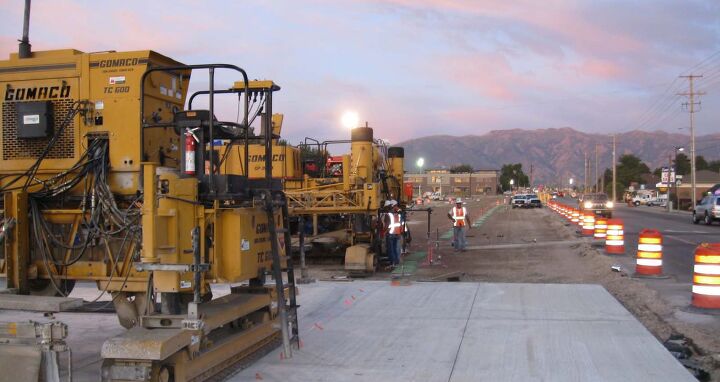Obama Budget Proposes Tax On Corporate Foreign Earnings For Roads
President Barack Obama unveiled his annual budget Monday, which includes a proposition to tax corporate foreign earnings to fund the nation’s roads.
Vox reports the proposal would levy a one-time tax on 14 percent of foreign earnings held by U.S. corporations, pulling in $238 billion to help supplement taxes collected at the pump. The collected taxes would then be distributed into road infrastructure projects at a rate of $79.7 billion per year over the next six years, totalling $478 billion.
Meanwhile, Sens. Rand Paul of Kentucky and Barbara Boxer of California have both offered a “repatriation holiday” to said corporations, giving the latter a tax rate of 6.75 percent over five years on foreign earnings brought back to the United States. The taxes would then go into those projects.
However, such holidays have been frowned upon by Obama over his two terms, warning that corporations would lobby Congress for more tax holidays; the Joint Committee on Taxation found such holidays would lose money over a decade despite the short-term gain.
Another option, proposed by Rep. John Delaney of Maryland, would tax corporate foreign earnings at a rate of 8.75 percent while ending deferrals. The bill would collect $170 billion to be spent on roads for six years.
Whatever happens, a decision would have to be made within the next few months. The U.S. Highway Trust Fund will go empty once again if nothing is done by May 31 of this year, forcing Congress to make do with the gas taxes collected. Since most people are driving less and using more fuel-efficient vehicles to get around these days, those taxes — which haven’t been raised above 18.4 cents/gallon since 1993 — fall short of the $50 billion per year needed for infrastructure; the current rate is of collection is $34 billion/year.
Two options have been proposed to fix the main issue — increase the gas tax and then pegging it to inflation, or expand drilling on federal lands and collecting the royalties — but neither option is popular among most in the Beltway.
Seattle-based writer, blogger, and photographer for many a publication. Born in Louisville. Raised in Kansas. Where I lay my head is home.
More by Cameron Aubernon
Latest Car Reviews
Read moreLatest Product Reviews
Read moreRecent Comments
- Jeff I do think this is a good thing. Teaching salespeople how to interact with the customer and teaching them some of the features and technical stuff of the vehicles is important.
- MKizzy If Tesla stops maintaining and expanding the Superchargers at current levels, imagine the chaos as more EV owners with high expectations visit crowded and no longer reliable Superchargers.It feels like at this point, Musk is nearly bored enough with Tesla and EVs in general to literally take his ball and going home.
- Incog99 I bought a brand new 4 on the floor 240SX coupe in 1989 in pearl green. I drove it almost 200k miles, put in a killer sound system and never wish I sold it. I graduated to an Infiniti Q45 next and that tank was amazing.
- CanadaCraig As an aside... you are so incredibly vulnerable as you're sitting there WAITING for you EV to charge. It freaks me out.
- Wjtinfwb My local Ford dealer would be better served if the entire facility was AI. At least AI won't be openly hostile and confrontational to your basic requests when making or servicing you 50k plus investment and maybe would return a phone call or two.


































Comments
Join the conversation
Wadeaminnit! I thought the "stimulus" package that busted the budget and the deficit was supposed to be for "shovel-ready" infrastructure projects? Originally, the gas tax and the Federal Highway Trust Fund was intended to be the funding mechanism for highway construction. Then, at some point, large chunks of that money started being used to fund mass transit. Indeed, our lovely metro DC subway system was one of the leading beneficiaries. Then it started being used to fund bicycle projects. And, no, I'm not buying the too-clever-by-half argument that these projects benefit highway users because it "keeps people out of cars." By that logic, airline passengers and railroad passengers (what few there are) should get these benefits, too. After all, if I take a train or fly to New York, I'm not on the road in a car. Personally, I would be happy to support a gas tax increase. I agree with the point that, on an inflation-adjusted basis, the federal tax has been reduced over the years. But I would have two provisos: (1) the federal highway trust fund should return to being used exclusively for highway projects and (2) the Davis-Bacon Act requirement that only union labor be used, regardless of price, be rescinded. Is it really fair that people in, say, Oklahoma, are paying gas tax so I can ride in my city's subway system and meanwhile, their highways are full of chuckholes. I can testify to the fact that the right lane of I-40 in Oklahoma is so beat up from trucks that everyone avoids driving in it whenever they can.
To the left-wing parasite monkey-children, more is never enough.